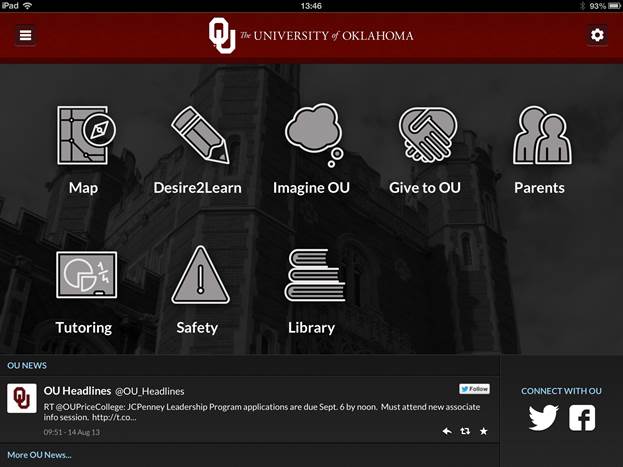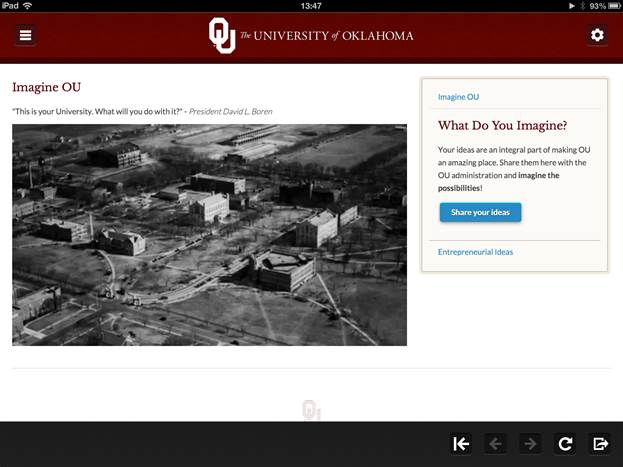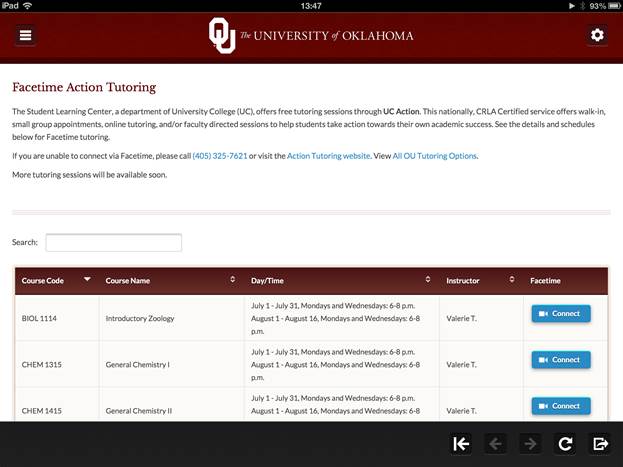Key Takeaways
- The One University digital initiative is an ongoing effort to improve the student and community experience at the University of Oklahoma through innovative new technologies and digital projects.
- In keeping with a key goal of lowering costs for students, current projects include making content available through digital textbooks, which is already saving an average of $400 per student each year.
- Another project uses iTunes U to make OU academic content available to life-long learners around the world, meeting the university's goals of offering free educational content.
- Students now have hands-on access to the most innovative and unique technology in the world to inspire and intrigue with projects such as Google Liquid Galaxy, interactive walls, and 3D printing.
Erin Yarbrough is director of Web Communications for the University of Oklahoma.
In summer 2012, a task force at The University of Oklahoma (OU) launched a digital initiative, One University [http://www.ou.edu/oneuniversity], aimed at transforming the student experience through a series of new technologies and digital tools. The initiative's task force, composed of representatives of the university's key academic and administrative areas, identified four specific goals:
- Save students money by offering cost-effective alternatives to traditional learning materials.
- Enhance learning experiences both inside and outside the classroom.
- Support the university's public mission by providing free educational open content.
- Build on the university's strong sense of community by using technology to better connect community members.
Innovation through One University
One University began as a collection of projects that would broadly impact the OU community and the entire state of Oklahoma. These projects included giving iPads to some full-time undergraduates, offering digital textbooks, developing interactive technology exhibits for the university store, offering university content through iTunes U, and creating a custom iPad app to facilitate community interaction (see figure 1).

Figure 1. Custom OU iPad app
Showcasing Technology
The One University Store (which opened September 23) will be a central part of the student union and also support the One University digital initiative's goals.
At its core, the space is a technology store featuring the most sought-after technology on campus. However, once students, faculty, and staff enter the store, they'll become experiential learners through a series of interactive and uniquely engaging exhibits that will encourage visitors to innovate and create. Just as Walt Disney sought to inspire innovation through the idea of Epcot, the One University store seeks to encourage and drive innovation by campus community members.
iPad Rollout
With iPad programs in K–12 schools growing exponentially, it was critical to teach our Education students how to use technology in the classroom and help them become leaders in the K–12 environment. So, beginning in spring 2013 we launched a program to give fully admitted undergraduates in the Jeannine Rainbolt College of Education iPads to transform their own educational experience and help them develop digital content to use in their teaching careers.
Greg Garn, dean of the Jeannine Rainbolt College of Education, talks about the iPad rollout (2:42 minutes).
According to Theresa Cullen, associate professor in the College of Education, the program had both individual and collaborative benefits. "We are trying to design this collaboration to get the students engaged with the faculty so that they are learning together as future and current educators," she said.
In addition, the iPad program supports the college's faculty in researching the impact of the iPad technology on future leaders.
As students within the Jeannine Rainbolt College of Education found success with learning in new and unique ways with iPads, other departments on campus began creating iPad programs. Within our Action Tutoring Center, for example, students began using iPads in new learning environments for engaging with faculty and tutors within tutoring sessions.
"Most importantly, students felt that iPads actually did help with their learning," said Cindy Gordon, associate professor of biology and faculty in the Action Tutoring Center. "It wasn't just a cool toy you use, it actually got them engaged and helped them learn the material better."
Digital Textbooks
To help offset the skyrocketing cost of textbooks, a subcommittee of the One University task force began investigating and identifying free or low-cost digital textbook alternatives during the 2012–2013 academic year. As a result of those efforts, OU students now can save an average of $400 per year by adopting digital options.
Kelly Damphousse, interim dean of the College of Arts & Sciences, talks about the benefits to students of free online textbooks (22 seconds).
One such option, made possible through a partnership between OU and OpenStax College, provides free peer-reviewed textbooks written by professionals. This partnership lets students download a free ePUB textbook that offers interactive note-taking features. As student Brooke Wiederkehr of the College of Arts & Sciences noted:
"What I liked most about this textbook alternative was that it could do everything a normal book could and more, but was cheaper and right on my laptop. I thought I would have to sacrifice tools such as highlighting, but the textbook alternative still had that option. Also, the textbook alternative made finding the chapters and subjects I needed even faster than with an actual book."
Another option lets faculty members use the free iBooks Author platform to create their own textbooks, course packets, and study-abroad travel guides. Also, in some cases, web-based open content is available to satisfy course textbook needs, so faculty members can use free tools such as iTunes U to deliver content to students that was previously offered only in a physical text.
ITunes U
Through iTunes U, the university has created global access to OU while also offering users distinctive online content that enhances the traditional classroom experience. As the largest collection of educational materials on the web, iTunes U provides a platform to easily offer courses and other resources for which OU is a recognized leader, such as meteorology courses and American constitutional heritage courses.
Kyle Harper explains the benefits to the Institute for the American Constitutional Heritage of One University (28 seconds).
"We can reach people beyond the walls of campus with the kind of intellectual content, the kind of stimulating conversation, the kind of excitement about learning that happens on campus and can happen anywhere," said Kyle Harper, senior vice provost and director of the Institute for the American Constitutional Heritage.
As more popular OU content becomes publically available through iTunes U, people from around the world are taking advantage of its accessibility. This year alone, people from more than 140 countries have accessed OU videos on iTunes U. In addition, OU students can use iTunes U to promote their programs, passions, and future careers.
For example, the Oklahoma Weather Lab's "Talking Up A Storm" series, created by students to showcase weather forecasts around the world, is currently featured on iTunes U.
Also available is "The Story of Freedom in America," an enormously popular series of lectures featuring the late J. Rufus Fears, an internationally renowned historian and scholar. These lectures are the only open and free lectures recorded by Fears prior to his unexpected death in October 2012.
Custom iPad App
Short introduction to the iPad app (54 seconds)
To connect the OU community in greater, more meaningful ways, a mobile operating system project yielded the university's first iPad app in summer 2013. This app, targeted at students, prospective students, alumni, and parents, includes an "Imagine OU" section that puts the power of innovation in the community's hands by inviting them to directly submit ideas to the university administration on topics such as how to make OU a better place or suggestions for student entrepreneurial projects (figure 2). The app also features FaceTime Tutoring, which connects students with OU tutors and faculty in a variety of disciplines outside regular class times and business hours (figure 3).

Figure 2. Imagine OU web page

Figure 3. Action Tutoring web page
Status of Implementation
As an ongoing process to continuously use technology to transform the student experience, the One University digital initiative will never be truly complete. With six iPad programs now implemented on campus, more than 500 videos on iTunes U, digital textbook alternatives, an innovative technology store, new ways to connect with the university, and a host of other soon-to-be-released projects, One University is poised to build on its existing foundation.
As with any large-scale initiative, the challenge for One University is to consistently move forward quickly, yet effectively, and maintain this pace as new opportunities arise and technology changes. However, One University has continually demonstrated that it can meet this challenge through thorough planning, thoughtful project execution, and a constant eye toward the future.
One University's Impact
The projects that most readily lend themselves to metrics are digital textbooks and iTunes U. With a measurable cost savings for students, the digital textbook initiative clearly has a significant impact on OU students. We can reasonably expect the annual savings per student to double or triple as more faculty adopt and implement digital textbook alternatives.
We can measure the university's iTunes U project success through its documented 1.3 million interactions and content views in more than 140 countries. Outside of the United States, China has the highest number of views of OU's iTunes U content.
The anticipated future impact is great as well. Future One University projects are developed to meet the initiative's goals: lower costs for students, enhance learning experiences, open content provision, and/or an increase in community connection — all through digital means.
© 2013 The University of Oklahoma. The text of this EDUCAUSE Review Online article is licensed under the Creative Commons Attribution-NonCommercial-NoDerivs 3.0 license.
